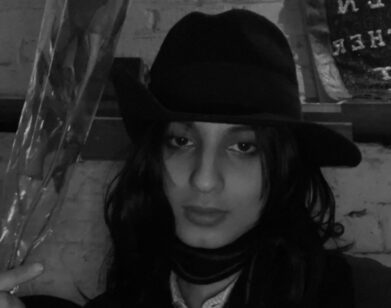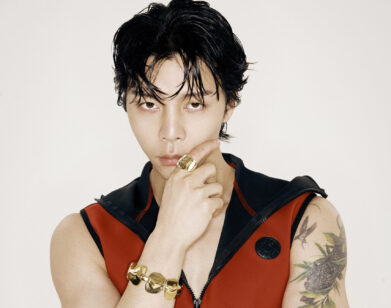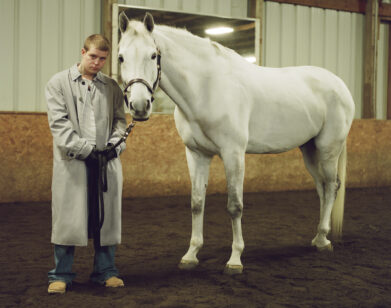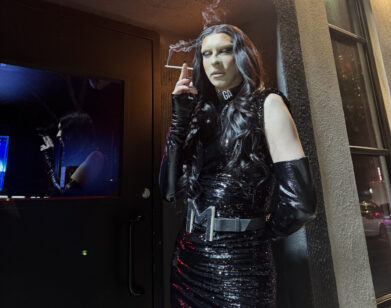How The Temper Trap Learned to Soar
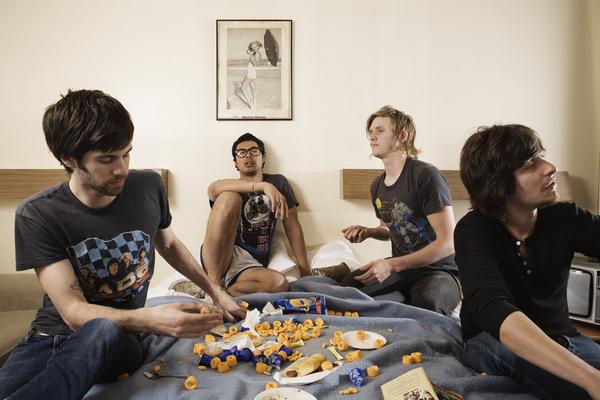
THE TEMPER TRAP IS (L-R): TOBY DUNDAS, DOUGY MANDAGI, JONATHON AHERNE, AND LORENZO SILITTO.
It’s been 500 days of summer for The Temper Trap: the pop-rock foursome has been riding a wave of popularity since their first album, Conditions, came out almost a year and a half ago. Thanks mainly to the soaring single “Sweet Disposition,” which has turned up in very visible commercials for everything from Coca-Cola to Chrysler to this summer’s Eat Pray Love, the Aussie act has injected itself into the American mainstream. Lead singer Dougy Mandagi’s vocals and the band’s propulsive, heart-on-its-sleeve sound have earned them comparisons to Coldplay and U2. We caught up with bassist Jonny Aherne at last weekend’s Austin City Limits.
DARRELL HARTMAN: I gather you’ve been on the tour bus a lot lately?
JONNY AHERNE: I think we’ve done maybe 60 festivals in the last year and a half-just loads of shows.
HARTMAN: You’ve had some crazy exposure, with the (500) Days of Summer soundtrack and some major TV commercials. How important has that been for the band?
AHERNE: Just to hit every avenue of exposure—without being too distasteful about it—has been so helpful. How people find music is so different now, and America is so big. It’s different from the U.K., Europe, or Australia. We’ve come back here five times in a short period and we’re just getting to that place where there’s a broader awareness of the band.
HARTMAN: Have you ever worried about licensing yourself, or that one song, too much?
AHERNE: Naturally there’s some concern about the perception of the band, but it’s really quite simplistic for us. We’ve got this opportunity, we’ve put out this album, and we want people to hear it. We could just depend on radio but we thought, “Let’s go with it.” And I mean, I don’t know anything about Chrysler cars, but I drink Diet Coke, I like the movie—when you boil it down, I feel okay about it. It’s gotten our music out there and led to people coming to shows and buying an album and experiencing more than one song.
HARTMAN: There’s something very emotionally accessible about your music—it seems to open people right up. I found a comment on an online message board that went something like: “This song reminds me of a guy I had great sex with and want to be my boyfriend.”
AHERNE: What? That’s crazy! And hilarious. I guess YouTube and those forums are the place for honesty.
HARTMAN: I guess another element of your broad appeal is that the lyrics deal with universal themes; not just that, but they’re don’t get too specific. They don’t tell a story—which lets a listener (or a corporate brand) graft their own story onto it.
AHERNE: You’re right—Dougy is definitely not trying to tell you a story, although if I ever want to figure out what’s going on with him, I listen to his lyrics. They’re sort of him, processing.
HARTMAN: His signature sound—and the band’s, in a way—is that soaring falsetto. Tell me about how you use his voice as a tool.
AHERNE: It’s definitely the thing that’s tied together all our songs. None of us are incredible musicians-we’re sort of limited. But he has range. From how he was singing when the band started six years ago to how he’s singing now, all the experimentation it took to get to that soulful place—it’s been cool to go on that journey with him.
AHERNE: Do you ever build songs around his voice?
HARTMAN: No—we’ve always done the music first. He’ll take the song and just sort of put the vocal around it. The whole soulful edge, the falsetto, that’s become more of an angle recently. But it comes naturally to him, and he enjoys it. I do too.
HARTMAN: What’s next for you, performance-wise?
AHERNE: We’ve played big shows and amphitheaters and stuff like that, but I guess the final frontier is playing a stadium. One place I’d really love to play is Red Rocks, in Colorado. It’s a natural amphitheater, I guess, but it’s stadium-esque.
HARTMAN: Which bands would you say are your major points of reference?
AHERNE: For modern influences, TV on the Radio and Radiohead. Dougy listens to a lot of Curtis Mayfield. For me, it’s been everyone from the Yeah Yeah Yeahs to U2. Everyone’s taste is really different, but we all like U2. That’s a big one.
HARTMAN: There are some definite similarities. There’s something very inclusive about their music that seems to work well with the save-the-world element Bono has added with his offstage projects. What do you think about that combination?
AHERNE: Bono is such a complex figurehead—everyone has an opinion about him. I personally like him and what he’s fighting for. And that lyric: “Have you come here to play Jesus/To the lepers in your head?” It’s powerful. It’s maybe my favorite lyric ever.
HARTMAN: Have you ever seen them live?
AHERNE: Never. I really want to.
HARTMAN: Where were you last time they came to Australia?
AHERNE: I don’t think I could afford a ticket. [LAUGHS] It would have been awesome to support U2, but it was between us and Jay-Z supporting him in Australia [in December, for the U2360° tour]. Jay-Z got it, of course, bless him.



